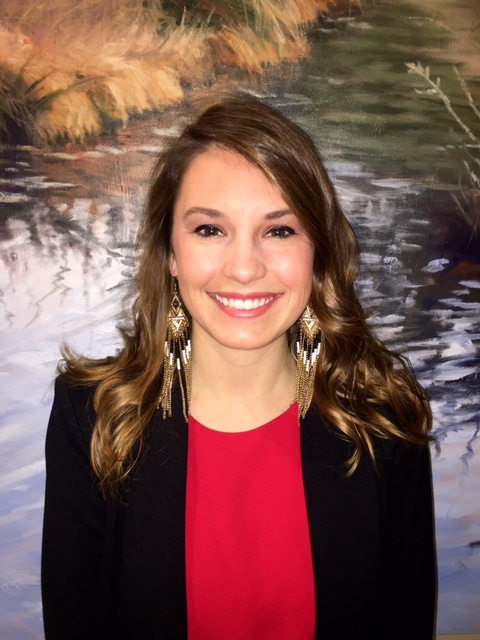Chickasaw woman is a rarity...an American Indian engineer

This article appeared in the August 2017 edition of the Chickasaw Times
HOUSTON – Sheer willpower to never acquiesce led Chickasaw citizen Caroline Colbert to where she is now – living her dream working in the engineering field.
Four years of hard work at Chevron has paid off. Ms. Colbert is a reservoir engineer for the California-based multinational energy corporation.
“Chevron has moved me quickly into a variety of positions,” Ms. Colbert said. “This is the third position that I have been in since I started and every job has been very different. It keeps things exciting and allows me to continue growing my technical skills.”
She builds full-field economic models to understand the present value of assets. She evaluates production, operating costs and competitor activity, and works closely with cross-functional teams to understand other field dependencies such as land, commercial and regulatory environments.
KEY TO SUCCESS
Reared in Ardmore, Okla., Ms. Colbert stayed involved with Chickasaw Nation programs, earning scholarships while attending high school and college.
“I loved math growing up,” she said. “I quickly realized how much I loved problem-solving and decided I was going to study engineering in college.”
She attended the University of Oklahoma to major in chemical engineering.
Summers were spent investing toward her future career.
She worked summers at a petrochemical company in Oklahoma City. That experience led to a summer internship at Shell Oil Company in Houston.
“With two internships on my resume and entering my senior year of college, I walked into the career fair knowing I wanted to work in upstream oil and gas as a petroleum engineer, which is not typically the norm for a chemical engineering student,” Ms. Colbert said.
After earning her degree, she relentlessly pursued her dream career.
“Being confident in what I was looking for in a job helped me get an interview with Chevron and here I am today,” she said.
Ms. Colbert understood achieving success meant going the extra mile to fully comprehend everything the engineering field encompassed.
“I quickly realized that gaining experience was just as important as good grades in the engineering world,” she said. “Not only does experience make you more marketable, it helps you figure out exactly what you are looking for in a career.”
COMING FULL CIRCLE
Channeling her heritage, Ms. Colbert participates in many cultural programs allowing her to network with fellow Native Americans.
“One of my favorite things I get to do is recruit at the American Indian Science & Engineering Society (AISES) National Conference, she said.
“The Chevron AISES Recruitment Team travels to the conference every year to recruit a variety of people who excel in different disciplines. It is so much fun to be a Native American representative for Chevron. I love to see students there seeking opportunities.”
Ms. Colbert is also a member of Chevron’s Native American Network (NAN), coming together with her peers to mentor and recruit Native Americans for potential opportunities at Chevron.
“Every summer I volunteer through NAN to be an informal mentor to an intern,” she said. “In the past, I have been matched with an intern we recruited at the AISES conference, which is a great experience.”
Miss Colbert’s Chickasaw heritage helped to provide many beneficial educational opportunities. She shares her knowledge with other Native Americans interested in engineering.
When she isn’t busy working or participating in extracurricular programs, she places importance on going out with her friends, playing with her dog at the park or vacationing.
“It is just as important to take care of your personal life as it is to work hard on the job,” she said. “I try to spend as much time with my family and friends as I can outside of work.”
Ms. Colbert is the daughter of Chickasaw Nation Supreme Court Justice Mark and Kim Colbert, of Ardmore.
Ms. Colbert did not wait until she was an adult to strive for her dream, but instead embraced every opportunity her education and Chickasaw culture extended to her.
“I have always tried to stay involved in my heritage whether I was in high school, college or a young professional working in Texas,” she said. “I believe opportunities will present themselves if I continue to work hard.”